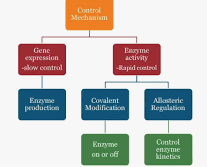ENZYME REGULATION Multiple Choice Questions :-
1. Allosteric enzymes are
A. larger than simple enzyme
B. smaller than simple enzyme
C. larger and more complex than simple enzyme
D. smaller than simple enzyme but not complex
Answer: C
2. Intracellular enzymes
A. synthesize cellular material only
B. synthesize cellular material and perform catabolic reaction
C. synthesize cellular material and perform anabolic reaction
D. only provide energy to the cell
Answer: B
3. Enzyme catalase has non-protein metal as
A. magnesium
B. manganese
C. iron
D. zinc
Answer: C
4. Isozymes or iso enzymes are those enzyme which
A. have same structural forms
B. have different structural forms but identical catalytic properties
C. catalyses oxidation reactions
D. none of these
Answer: B
5. Enzymes are
A. organic compounds produced by living organism
B. inorganic compounds
C. organic as well as inorganic compounds
D. all of these
Answer: A
6. Main function of an enzyme is to
A. increase the activation energy
B. decrease the activation energy
C. maintain constant activation energy
D. none of these
Answer: B
7. Who coined the word enzyme first?
A. Kuhne
B. Pasteur
C. Liebig
D. Buchner
Answer: A
8. The inactive protein from of enzyme is
A. apoenzyme
B. enzyme
C. haloenzyme
D. cofactor
Answer: A
9. The inactive organic molecular portion of enzyme is
A. apoenzyme
B. coenzyme
C. holoenzyme
D. none of these
Answer: B
10. Many enzymes consists of a protein combined with low molecular weight organic molecule called as
A. apoenzyme
B. co-enzyme
C. holoenzyme
D. co-factors
Answer: B

ENZYME REGULATION Objective type Questions with Answers
11. Organic molecules that increase the rate of metabolic reactions with themselves changing are known as
A. coenzymes
B. enzymes
C. substrates
D. reactants
Answer: B
12. Protein portion of an enzyme when it is combined with organic molecule is termed as
A. apoenzyme
B. co-enzyme
C. holoenzyme
D. co-factors
Answer: A
13. The active form of enzyme is
A. apoenzyme
B. coenzyme
C. holoenzyme
D. none of these
Answer: C
14. Enzymes can
A. not pass through semipermeable membrane
B. pass through semipermeable membrane
C. dissolve semipermeable membrane
D. none of these
Answer: A